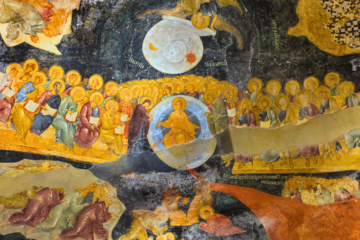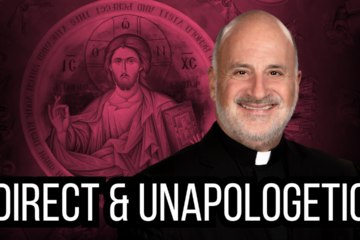The following in an excerpt from “Eros of Orthodoxy,” translated by Fr. Nicholas Palis and written by Mr. Pantelis Paschou.
According to the mystical theologians of Orthodoxy, man’s inner world, that is his heart, influences and is influenced by his external world, in other words, by his flesh, his body and his senses. And when the senses of the body (that is, vision, hearing, smell, taste and touch) with bodily pleasures corrupt the senses of the soul (that is, the mind, the understanding, the glory, the imagination and the sense – with the special meaning which the spiritual philosophers give these words), then man starts becoming a robber’s den, and a man of the passions.
As soon as sins start entering the gates of the senses and setting up their filthy thrones inside us, our heart becomes inappropriate to be the dwelling place of God, of the pure bridegroom. The wise Solomon says it in other words: “Wisdom will not enter a deceitful soul, nor dwell in a body enslaved to sin” (The Wisdom of Solomon, 1:4). Later, St. Gregory the Theologian: “Myrrh is not entrusted to a rotten container”. How is it possible for Holy God, about whom the Old Testament writes, “The fragrance of your myrrh is above all aromas” (The Song of Songs, 1:3), to dwell in the impure container of our sinful body?
“For it is not proper for the pure to touch the impure,” St. Gregory the Theologian advises us. “Who wants to approach God, to cleanse oneself, one’s senses and afterwards dare to approach? First let him cleanse himself, then he will be able to talk to the Pure One.” Without purity of the senses, there is no purity of the body, nor purity of the heart, and without purity of the heart, man cannot get to know the mysteries of theology, nor to see God, according to the words of the blessing which says: “Blessed are the pure in heart for they shall see God” (Matthew 5:8).
“Without purity of the senses, there is no purity of the body, nor purity of the heart, and without purity of the heart, man cannot get to know the mysteries of theology, nor to see God.”
In the winter, if the wind opens the window or the door, we run to close it. Or when, from the snows and the strong rains, our roof leaks, we immediately get a carpenter to replace and correct the clay tiles so that our house is not wet and our things become ruined. Thus also, with the senses of our body! We are in danger when we leave them like wide-open gates as well as when we remain detached from these and don’t censor them with the Word.
On this, Abbot Theodore the Sabaite says relatedly: “With reason we should hasten to achieve training the senses, eyes and ears and tongue, not passionately but allowing to see and hear and speak for our own gain. For nothing is more slippery towards sin than these organs, if not trained by reason. For when these are unruly, smell becomes lost, and touch is rashly extended, and the swarm of innumerable passions enters in.”
This swarm of innumerable passions, which forcefully enter into us, comes with the power and smell of death to dwell within us. Thus that fearsome saying of the Prophet Jeremiah: “Death arose through the gates” (9:21). Because when, with the senses of the body, the soul is also spilled out with its own senses outwardly towards the sinful things of the world, then the senses become little gates from which death enters and dominates us.
These little gates then become gates of Hell, because they take us far from God and make us relatives with the father of sin, the devil. And for this reason, the Holy Fathers speak so much of these little gates, which play a decisive role in the everlasting salvation or perdition of our soul and advise us not to neglect and be liberal when it concerns the little gates of our senses: “Do not be liberal with the roads of evil and entrances of sin before us” (St. Gregory the Theologian). As if they are telling us, close the gates so that the death that lies in waiting does not enter into us.
“Death arose through the gates” – Prophet Jeremiah
These words probably seem very excessive for whoever has no knowledge or foretaste of the spiritual philosophy of the neptic fathers. But it is – as tragic as it seems – true that whoever is separated from God meets up with Satan, which means that he dies spiritually.
Because the soul of man, when it occupies itself “in divine things”, according to the word of St. Niketas Stethatos, “turns its external energies of the senses internally, by divine and ceaseless attending prayer, with tears and compunction. One is widened in his love for all creation and through the beauty of these, he hastens to Him and enters into participation and grace of His position.”
But when the soul becomes neglectful and the mind in an unruly way inclines toward the sensorial things, “immediately the deviation through the unguarded movement of the soul’s senses follows.” This “deviation” of the soul is the first step for death to enter us since it has made friends with our senses. We are now on the edge of the cliff of the senses. A little more, and Satan will celebrate his victory over us, if we don’t immediately seek God’s aid.
“He who does not see and hear and feel spiritually is dead!” – St. Gregory the Sinaite
“My spirit shall not remain in these men unto the ages, because they are fleshly,” says God in the Scripture. And thus, now that we will be dipped into the luxuries of our external senses and having the senses of our soul deadened and voiceless, without any strength to react, we will be merely a form of moving corpses.
Earth which moves and has the form of man, but without any inwardness, without nerves or soul, without spirit which will show the aliveness of man, how just and true does the expression of St. Gregory the Sinaite now seem: “He who does not see and hear and feel spiritually is dead!” Even if his body seems externally robust, even if the world dresses him with royal purple robes and surrounds him with glory and attention: in him he carries death which is born of sin.



0 Comments